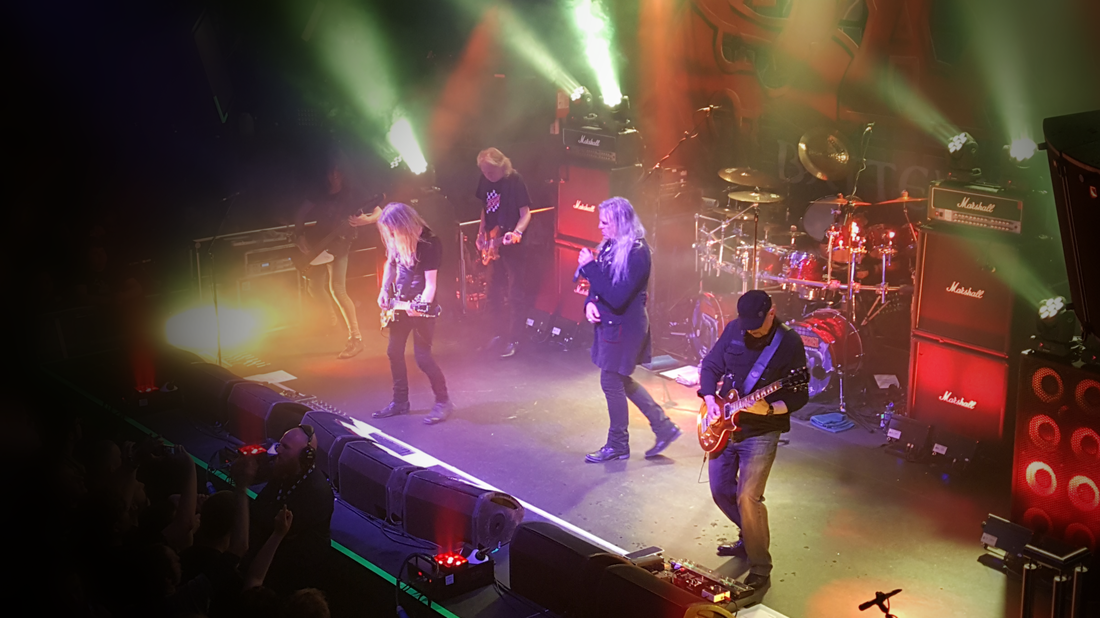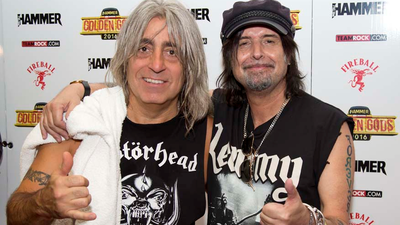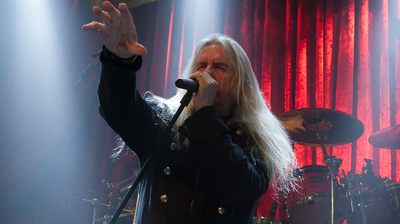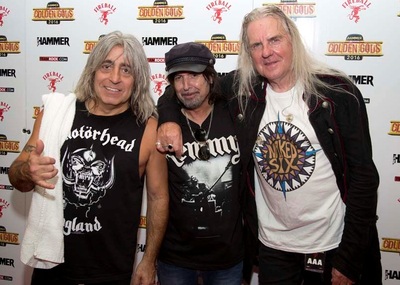|
‘Fast’ Eddie Clarke needs little introduction. Part of the celebrated Motörhead line-up that recorded the classic albums ‘Ace Of Spades’, ‘Overkill’, and ‘Bomber’, along with Ian ‘Lemmy’ Kilmister and Phil ‘Filthy Animal’ Taylor, the guitarist and producer helped steer the band to their greatest successes. The last survivor of the three amigos following the deaths of Lemmy and Phil in 2015, Eddie has just finished up a stint on the road with his own Fastway. We sat down for an EXCLUSIVE in-depth chat about the highs and lows of his Motörhead past, and what lies ahead. Stone dead forever; Eamon O’Neill.
Hi Eddie, how are you today?
Well, better than I was yesterday. I’ve been having this temperature thing. I think I caught a chill somewhere. That’s not what you want at the start of a tour, is it? No, there’s a lot of it about, and I’ve got this emphysema thing on my lungs, so if I get a little thing like that, of course, I can’t breathe. On Sunday [in Belfast], I was in terrible pain on stage. I have to start off by asking you about the events of the past year, and the passing of both Lemmy and Phil Taylor. It was a bit of a shock for me when Lemmy went. I’d been seeing Phil a lot and he was slowly going, and then he went. The night he went, I was at the Classic Rock Awards [in London], and Lemmy was there, and I had a little chat with Lemmy, and he was in a f*****g bad way. I really was quite shocked. I was supposed to do Hammersmith with them; get up and do two or three numbers with them at the end, and I had a chat to him about that. He did seem very frail, and I did think; “f**k, I wonder if he’s going to make it”. I didn’t think he was going to f*****g die though; I thought he might just be able to stop touring. Of course, then I got the call just after Christmas from his manager. He’d just been diagnosed with the big cancer. There was two months to live, and he died that night. You’re the last man standing from that most celebrated line-up of Motörhead; how does that make you feel? Well, it kind of is not an enviable place to be, but it is how it is. I did stop partying as heavy as they did; Phil carried on right until he had his aneurism in 2010, and Lemmy; he always paced himself ever since I’ve known him in 1975, but I’m sure he was doing the same thing, so that’s a long time to be partying heavily. But he was strong as an ox, old Lem, but me; I stopped drinking many years ago, so I had the advantage over everybody. Living that kind of lifestyle obviously catches up with you. I think so, yeah; powdering, smoking. I only gave up smoking about eight years ago, that’s why these lungs are f*****d. If I’d stopped doing it [earlier], I probably wouldn’t be so bad right now. But yeah, it takes its toll. Didn’t the three of you did meet up recently, backstage at a Motörhead gig? That was 2014. I went to Birmingham, and I got Phil to come down, and that was the last time we got together. But before that, I think the last all three of us were together was 2002, when I went to L.A. We had a meeting, and me and Phil had a bust up. *laughing* I thought I was going to f*****g hit him! Was there ever any talk of getting the three of you from the classic Motörhead line-up back together?
I talked about it in the late nineties with Lemmy. I had a serious conversation with him, and it was looking pretty good. It was kind of like; not to upset the present band – we were going to come up with maybe an acoustic thing, or one of them unplugged things, but do it in a really sort of different way; get [a female orchestra] in all the suspenders and stockings, and cellos and all that – try something like that. And obviously I’d have loved to have gotten back together, but Lemmy, he couldn’t face down his band, really – he felt too guilty. So Lemmy didn’t want to let the current band down? No, even though there was talk of a compensation package for them for the year off, but I don’t think he had the stomach for it. And you’ve got to remember that he’d been with [guitarist] Phil Campbell since 1984, I think. So it’s a long time, and you’ve got quite a bit of loyalty. And Mikkey Dee had been with Lemmy for quite some time too. Since ’93, because he replaced Phil, of course, and Phil never got over that. The three of you did reunite virtually, at least, for the ‘Classic Albums’ series when they did an episode on Ace Of Spades’. Yeah, that was kind of funny. I was down in Spain on holiday, and I get this phone call saying; “will you do this thing?”, and I said; “of course I will”. Then I find out that they’ve already done their stuff in Los Angeles. So that’s why you were superimposed over the top them playing together? Yes! Nobody was going to ask me. Would I have done it? Of course I would, because it was ‘Ace Of Spades’, and I’m very big on the old legacy thing. I was really f****d-off, to tell you the truth, because I found out that they were actually going to do this and not even ask me. So it wasn’t a bad blood thing between you? Well… no, no it wasn’t, but Lemmy had this lawyer who really used to try and come between us. He would probably say; “I’m looking after Lemmy’s interests”, but I’ve always looked after Lemmy’s interests, always. I was the man who looked after them; that was one of the things I did, and that’s why we did so well. You must be proud of the fantastic legacy that the three of you as Motörhead have left behind.
Well I am, and the funny thing is, I was having some physio recently, and I said to the girl; “oh, you probably haven’t heard of my old band, Motörhead. We did a song called ‘Ace Of Spades”, and she said; “Oh, ‘Ace Of Spades’, I know that song!” And it happened again yesterday, so it’s kind of funny; they don’t know the band, but they know the song, which I think is probably the biggest accolade you can be paid. So yeah, we all done good, you know. Going back to 1982, and I’d like to talk about your exit from the band. Well, it was one of those things. They wanted to do the thing with Wendy O. Williams [the ‘Stand by Your Man’ EP], and it was a f*****g disaster. It was terrible, I mean it was so bad. I’m producing, and we had rehearsals, and three days in the studio in Totonto. We laid the backing tracks down, Wendy had a sing and it wasn’t sounding very good, so I had a chat with her, and she said she preferred a different key, so the next day we had it all changed again, and it just didn’t sound right. It sounded awful to me, the whole thing; I thought the song was badly paced, I thought the amount of chords they were putting in was wrong, but Lemmy would not budge, and we had a f*****g row about it. So tensions were high? At that session, at about seven in the evening, I said; “lets break for something to eat”, and I went to the nearest off licence - which is not easy in Canada - and I went back to the hotel and got drunk. I couldn’t do it. So they came into my room, and I said; “It’s terrible; we’re Motörhead, and I don’t want us to do it”. And they said; “well, we’re doing it”. I said; “you can’t, it’s f*****g rubbish”, but they insisted on it, and I said; “if you keep insisting, I’ll have no choice but to leave the band”. They said; “all right then, f**k off”. That must have hurt you. Oh, f*****g not many! Considering on the ‘Iron Fist’ tour, Phil threatened to leave the band in Glasgow because we weren’t playing the ‘Iron Fist’ album. But the reason we weren’t playing the ‘Iron Fist’ album was because the record company who forced us to make it really quick, didn’t get it out into the shops! We didn’t want to play it to blank faces, but Phil insisted, and we went out and we played it, and it wasn’t until the encore that the gigs came alive. And that’s why the whole ‘Iron Fist’ thing had a bad taste; if the album had been out I’m sure it would have been fine, but Phil made us play six or seven songs off it. We appeased him because he was going to leave, and I wasn’t saying I was going to leave to ‘leave’, I wanted them to know how bad I thought it was. I was quality control, and whatever you think, Phil and Lemmy were a bit cowboy-ish. I produced ‘Iron Fist’, and I mean, I did a good job of it, so I expected them to believe me, and they didn’t. But the E.P. progressed, none the less. It got from bad to worse, and I said; “let’s do three blues songs, quickly” – ‘Hoochie Coochie Man’, ‘Too Much Monkey Business’, or ‘Johnny B. Goode’ or something, and send them back with our engineer, and he could mix them in London and release it as ‘Motörhead Plays The Blues’, which was a great idea, I thought. But they didn’t want to do that, so of course it was bad blood from then on. And that was the beginning of the end.
What happened was, we played a gig in Toronto, then we drove down to New York, and they were playing Plasmatics songs all the way down and were wearing Plasmatics t-shirts, winding me up, badly. So when we got to the hotel in New York, we had a massive row, and one of the road crew tried to do me, and I managed to get in the lift before he killed me. I managed to look after myself on that occasion, but that was the end of it, then. I went round to the hotel where the road crew were staying, and then they f*****g kept me prisoner! I went into the guys’ room, and two of them came in and said; “oh, you can’t leave now”! They kept you prisoner to prevent you from doing a runner? I was trying to get Phil and Lemmy to do the show the following night, but they refused because I wasn’t in the band anymore, supposedly! People say I left, but I didn’t – I got thrown out, really, in real terms. But the show did go ahead, eventually? Yes, I was quite happy to do it. So anyway, there was a stipulation. Dig this one; ‘when we do the sound check, Eddie will have to go in on his own – we don’t want to be in the building with him’! So I had to go and do my sound check on my own, and then I had to leave the building, and they would come in and do their sound check. Can you f*****g believe this!? It must have been a tense night on stage. Well, it was fantastic, what can I say? The hate looks! We get to the gig time, and they put me in this little boiler room; there’s a little pile of speed on the table, a bottle of vodka, one chair, and my guitar’s on its stand, and that’s my dressing room. So what happened after the gig? After the show – which I though was terrible, the agent, Nick Harris came to me and said; “why don’t we go and talk to Phil and Lemmy”, and I said; “okay”, because I didn’t want to leave - it was the last thing I wanted. So he takes me into their dressing room, and it’s full, the Plasmatics, everybody’s in there. And they peel away from the crowd down the end of the dressing room, and I’m standing with Nick Harris and they say; “yeah, what do you want?”, and I said; “well guys, this is a bit over the top, isn’t it? Can’t we just carry on – what’s the problem here?!” They said; “no, man, f*** off”. And that was it, what could I do? So I walked out, and that was the end of it. So Brian Robertson came in at that point? Phil had become friends with Brian Robertson, and he had already told the office to send Brian Robertson over. It was Phil; Phil wanted this, I don’t know why. I was f*****g hurt. It turned me off heavy metal for a while. I couldn’t believe it; I thought; “what a dishonourable thing to happen” – it broke my f*****g heart. I thought I was going to die as a member of Motörhead. So you would have loved to have continued on in Motörhead?
Well, why wouldn’t I? I mean, Motörhead wasn’t Lemmy’s band; I wrote all the riffs, mate. He might have wrote a few words, but I’ll tell you, those riffs were good riffs. I love Phil, and it does annoy me a tad, but he didn’t write, or have a hand in that many of the tunes, but I always insisted that he had a third of it, so that we were all equal. I said to Lemmy at the time; “look, if we do it all equal, we won’t have us going to work in a Rolls-Royce, and Phil coming on a push bike, because it will destroy the band”. I only cared about the band. It wasn’t about money. Were you happy to see Lemmy carrying the band’s legacy on up until his passing? Well, do what you like then. It pissed me off though, with Mikkey [Dee] and with Phil Campbell, because they re-did all the old classics, and I think that was a f*****g travesty. I probably won’t talk to those guys. I’ve heard the full extent of it now, and it’s not something you should do. It was so they could use them for other things, and do us out of the money. I had a bit of a row with Lemmy, and Phil [Taylor] wouldn’t talk to Lemmy for a couple of years over that. You don’t do that. I was going to send Mikkey Dee a message on Facebook saying; “now you’re in The Scorpions, are you going to re-do all their early stuff?!”. Moving onto the present day, and why have you decided to bring Fastway back now? Because of Phil and Lemmy. They died and it put me in the shock. Girlschool and Saxon, they’re very close to my heart, because the ‘Overkill’ and the ‘Bomber’ tours were with them. So I said to my friend who’s an agent; “oh, maybe we should try and do something and try and put the package together”. This was obviously not long after Lemmy died, and by about April, it was a runner, and I thought it was perfect, because it had all the Motörhead context, the great feeling between the bands, and there is so much love between us all. Girlschool, Saxon, Biff – we go back, and I just thought it would be perfect. Is it good to be out on the road again? I’m not really fit enough to be doing this, but I thought I’d ride out one more time. I’ve had all this outpouring on my Facebook page; I really felt for the fans, you know? It really upset so many of them; how it changed their lives; “Motörhead done this, Motörhead done that” – it really meant a lot to a lot of people, and I didn’t fully understand that. I thought; “I’ll do it for them” - I owe it to them to go out, and I wanted to, because I always loved our fans. People forget; without them – you’re nothing. So many people forget that, and Motörhead was always a great fan thing; I mean, even when I went to see them in the dressing room in 2014, I walked in, and do you know what Lemmy was doing in the dressing room before the gig? Reading letters from fans. So that’s really what drew me out there. What would you like Motörhead to be remembered for? For having a great bunch of fans that made it all possible. You’ve got to remember that back in the seventies, the business didn’t want to have Motörhead anywhere near it, but it was the fact that the fans would not go away that kept us going. And as the fan base grew, the business had to in the end say; “we should put a record out of these guys”. So really, I’d like to be remembered as a band that really appreciated their fans. Finally, what’s your personal highlight from your career with Motörhead? I suppose the bomber [lighting rig], and the ‘Bomber’ tour. The ‘Bomber’ tour was great; that bomber was something else. It was great because, sometimes you’re having a bad show, and you’d be standing there thinking; “it’s okay, the bomber will be down next song!” And you knew that would always make everything all right – it was that good! Like this interview? Like us on Facebook and follow us on Twitter for regular updates & more of the same. |
|
'Fast' Eddie Clarke
"I had a serious conversation with Lemmy about a reunion, and it was looking pretty good. We were going to come up with one of them unplugged things, but do it in a really sort of different way. Obviously, I’d have loved to have gotten back together."
© 2016 - 2024 eonmusic.co.ukContact: [email protected]
|




